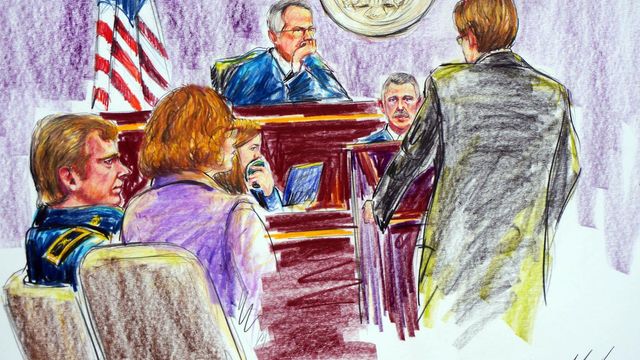Defense falls short in effort to end sex case against Bragg general
Once a rising star among the U.S. Army's top battle commanders, Brig. Gen. Jeffrey Sinclair is now fighting sexual assault charges that could land him life in a military prison if convicted.
Posted — UpdatedSinclair, who was the deputy commander of the 82nd Airborne, appeared Tuesday in a Fort Bragg courtroom to face court-martial on criminal charges that include physically forcing a female captain under his command to perform oral sex.
While denying that accusation, lawyers for the married father of two have said he carried on a three-year extramarital affair with the junior officer during war tours in Iraq and Afghanistan. The admission of an affair will almost certainly end his Army career.
Sinclair, 51, has pleaded not guilty to eight criminal charges, including forcible sodomy, indecent acts, violating orders and conduct unbecoming an officer and a gentleman.
In pretrial hearings, prosecutors have painted Sinclair as a sexual predator who abused his position of authority to prey on a subordinate trained to follow his orders. They also say he threatened to kill her and her family if she told anyone of their relationship.
Sinclair's defense lawyers suggest it is the general who is the victim, both of a jealous ex-lover and of overzealous prosecutors facing intense pressure from top military and political leaders to send a message that sexual misconduct will not be tolerated.
Lt. Col. William Helixon, the lead military prosecutor, resigned just weeks before the start of the court-martial, following a contentious pre-trial hearing in January where the defense contends the female captain perjured herself on the witness stand. A new prosecutor, Lt. Col. Robert Steele, is now forging ahead with the case.
"We're in a remarkable place," Richard Scheff, Sinclair's lead defense lawyer, said this week. "The chief witness lied under oath. The lead prosecutor resigned because he found her untruthful and non-credible. The Army's senior leaders agree with his assessment, and yet we're going to trial."
Scheff spent part of Tuesday on the witness stand to argue his motion that all charges be dismissed against Sinclair because of undue command influence in the case. He detailed conversations he had with Helixon after the Jan. 7 hearing in which the prosecutor himself suggested the Army was pushing the case for political reasons and wanted to make an example of Sinclair.
The case against Sinclair, believed to be the most senior member of the U.S. military ever to face trial for sexual assault, comes as the Pentagon is already grappling with a troubling string of revelations involving rape and sexual misconduct within the ranks.
Sinclair offered to plead guilty to adultery in exchange for the other charges being dropped, according to a defense motion filed last month, but prosecutors rejected the proposed deal because the accuser didn't care for it.
Scheff also noted that Capt. Cassie Fowler, a special victims unit lawyer representing the accuser, sent a letter up the chain of command and to Capitol Hill, urging officials to pursue the court-martial, which Scheff said was indicative of the outside influence in the case.
Lt. Col. Jerrett Dunlap, the acting judge advocate for the XVIII Airborne Corps, testified Tuesday that he spoke with a "distraught" Helixon last month, who expressed concerns over his health and family issues as well as his ability to prove the most serious charges against Sinclair. Helixon stepped down for "moral reasons," Dunlap said, not because he didn't believe the allegations against Sinclair.
Brig. Gen. Paul Wilson, a former staff judge advocate, testified that he sought mental health treatment for Helixon last month because the prosecutor appeared to be suicidal and was drinking heavily.
Helixon had made the case too personal, Wilson said, believing that it had "strategic importance" to the Army because it involved a senior officer. Instead, Wilson said, Sinclair's court-martial was no different than any other case where prosecutors are struggling to win a conviction with the testimony of a less-than-credible witness.
Wilson denied Scheff's allegation of undue command influence in the case.
Scheff also requested Col. James Pohl, the military judge handling the case, recuse himself because he is friends with Brig. Gen. Martin Schweitzer, a former Fort Bragg commander whom Sinclair once threatened in an email.
Pohl refused to step down, saying his friendship won't affect his impartiality, and he rejected the defense's effort to get the case dismissed.
Opening statements in the court-martial are scheduled for Thursday morning, and the case is on the docket through March 28.
Pohl said he wants to spend Wednesday questioning the jury, which was selected last fall, to ensure no issues have arisen that would prevent any member from hearing the case.
It is extremely rare for such a high-ranking military officer as Sinclair to face a jury. Under the military justice system, members of the panel must be senior in rank to the accused – ensuring that Sinclair will be judged by a jury of generals. One general had to be recalled from South Korea to sit on the panel.
• Credits
Copyright 2024 by WRAL.com and the Associated Press. All rights reserved. This material may not be published, broadcast, rewritten or redistributed.






